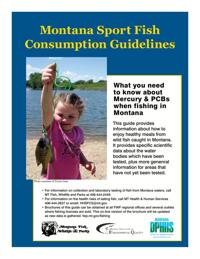To eat a fish or not to eat a fish, that is the question. Most states, including Montana, have Sport Fish Consumption Guidelines. Not all fish are advisable for consumption. Make sure to check out your areas advisories for healthy options.
Fish are contaminated due to what they eat. Some pollution, and contamination, passes through the food chain and ends up in the fish. Chemicals such as Mercury, PCB’s, arsenic, lead, sewage, and other contaminants.
Not all contaminants are Man Made. Geothermal features in Yellowstone Park spew harmful chemicals into outflowing rivers. Lead, Mercury, and arsenic are common pollutants from geysers and hot springs. This means that fish in the Madison, Yellowstone, and Gallatin Rivers have Consumption Warnings.
These food warnings are directed at children, nursing mothers, pregnant women, or frequent fish eaters. The older, and bigger, the fish, the more risk. A keeper walleye needs to be over 5-6 years old whereas a rainbow trout is a keeper within 2-3 years. Therefore, walleyes from Canyon Ferry, part of a watershed from Yellowstone Park, need to be eaten less. Most fish from the Great Lakes have the same problem.
If you choose to eat fish from any contaminated waters, skin the fish, trim away the belly fat and fin bases. Rinse thoroughly and cook completely. Eating these fish as sushi is not advisable.
Keeping caught fish on ice is also important. Ideally, you should dispatch the fish you plan to eat. Keeping them in a live well helps. Live fish on a stringer, towed behind a boat, or in a basket will add stress to the fish and ruin their quality. If you plan to keep fish, have a cooler with ice on hand.
Fish can also have parasites. Generally, any living parasite will be killed when cooked. Sushi could be an issue. At least soak the filets in salt water prior to consumption.
Montana FWP suggests.
Keep smaller fish for eating. Typically, they taste better and have had less time to accumulate pollutants.
Eat smaller meals when you eat big fish and eat them less often.
Eat fish that are less likely to be contaminated. Select healthy watersheds.
Clean and cook your fish properly. Trim the fatty portions off the fish. Cook in a way that drains juices away.
To check which watersheds in Montana have Consumption Warnings, look at page 17 in your regulations booklet. This info. Is also available on the FWP website at fwp.mt.gov/fwpDoc.httml?id=28187.
Eat hearty and healthy!
Montana Grant
Catch Montana Grant on Facebook.